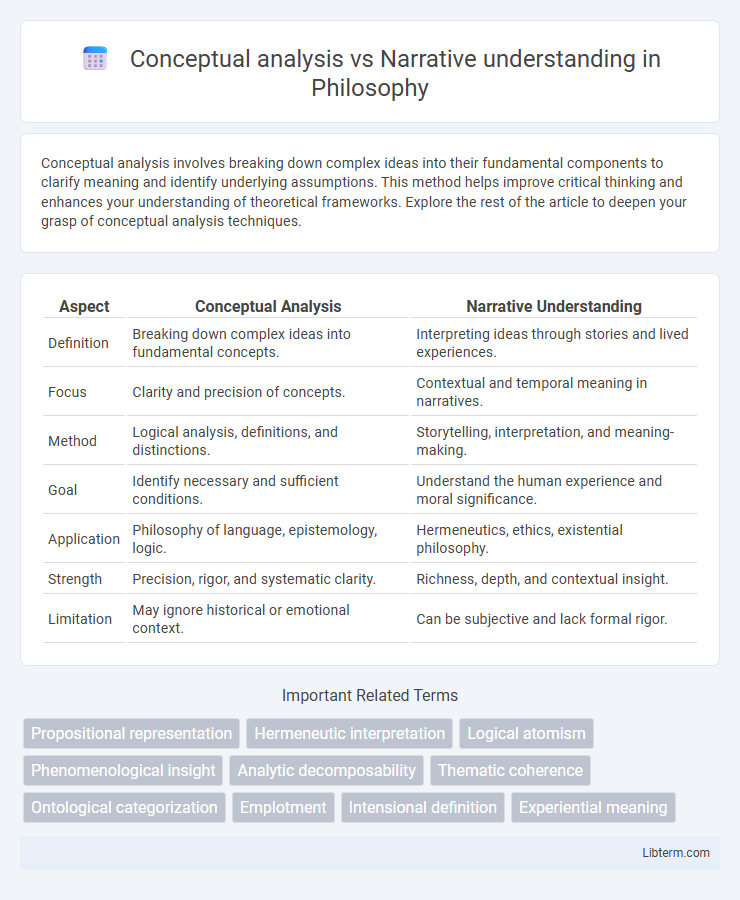Conceptual analysis involves breaking down complex ideas into their fundamental components to clarify meaning and identify underlying assumptions. This method helps improve critical thinking and enhances your understanding of theoretical frameworks. Explore the rest of the article to deepen your grasp of conceptual analysis techniques.
Table of Comparison
| Aspect | Conceptual Analysis | Narrative Understanding |
|---|---|---|
| Definition | Breaking down complex ideas into fundamental concepts. | Interpreting ideas through stories and lived experiences. |
| Focus | Clarity and precision of concepts. | Contextual and temporal meaning in narratives. |
| Method | Logical analysis, definitions, and distinctions. | Storytelling, interpretation, and meaning-making. |
| Goal | Identify necessary and sufficient conditions. | Understand the human experience and moral significance. |
| Application | Philosophy of language, epistemology, logic. | Hermeneutics, ethics, existential philosophy. |
| Strength | Precision, rigor, and systematic clarity. | Richness, depth, and contextual insight. |
| Limitation | May ignore historical or emotional context. | Can be subjective and lack formal rigor. |
Defining Conceptual Analysis
Conceptual analysis involves systematically breaking down complex ideas into their fundamental components to clarify meaning and resolve ambiguities. It emphasizes precise definitions and logical relationships among concepts to enhance critical thinking and philosophical inquiry. This method contrasts with narrative understanding, which prioritizes contextual and temporal coherence over analytic dissection of individual ideas.
Exploring Narrative Understanding
Narrative understanding emphasizes the interpretation of stories, focusing on the meaning derived from the sequence and context of events rather than isolated concepts. It involves recognizing patterns, characters, and plot developments to grasp the broader significance and emotional impact of a narrative. This approach enhances comprehension in fields like psychology, literary studies, and cognitive science by prioritizing holistic story integration over abstract conceptual analysis.
Historical Roots of Both Approaches
Conceptual analysis originates from early analytic philosophy, emphasizing clarity and precision in defining ideas, influenced by figures like Frege and Russell during the late 19th and early 20th centuries. Narrative understanding emerged from hermeneutics and phenomenology, with roots in thinkers such as Wilhelm Dilthey and Hans-Georg Gadamer, highlighting the interpretive and contextual nature of human experience. Both approaches reflect distinct historical trajectories where conceptual analysis prioritizes logical structure while narrative understanding emphasizes meaning through storytelling and context.
Key Differences Between Conceptual Analysis and Narrative Understanding
Conceptual analysis involves breaking down complex ideas into fundamental components to clarify meaning and identify underlying principles, often used in philosophy and critical thinking. Narrative understanding emphasizes interpreting stories and experiences to grasp meaning through context, emotions, and temporal sequences, primarily applied in literature and social sciences. Key differences include the abstract, analytical nature of conceptual analysis versus the contextual, holistic approach of narrative understanding.
Strengths of Conceptual Analysis
Conceptual analysis excels at breaking down complex ideas into clear, precise components, enhancing clarity and facilitating rigorous logical evaluation. It provides a structured framework for analyzing abstract concepts, making it invaluable in philosophical inquiry and scientific reasoning. This method supports objective assessment by minimizing ambiguity, which strengthens argument validity and promotes critical thinking.
Strengths of Narrative Understanding
Narrative understanding excels in capturing complex human experiences through storytelling, enabling deeper emotional engagement and contextual comprehension. It effectively integrates chronological events with personal perspectives, fostering empathy and rich interpretation beyond mere factual analysis. This approach supports holistic meaning-making by connecting individual experiences to broader social and cultural frameworks.
Limitations of Each Approach
Conceptual analysis often struggles with oversimplification, neglecting the nuanced context that shapes meaning, while narrative understanding may suffer from subjectivity and lack of clear analytical boundaries. Conceptual analysis relies heavily on abstract definitions, which can lead to rigid interpretations that fail to capture real-world complexity. Narrative understanding prioritizes individual perspectives, risking inconsistency and difficulty in generalizing findings across different contexts.
Applications in Research and Practice
Conceptual analysis dissects abstract ideas to clarify definitions and relationships, essential for theoretical research and developing precise frameworks in philosophy, cognitive science, and social sciences. Narrative understanding emphasizes interpreting stories and temporal sequences, crucial for qualitative research, clinical psychology, and education to capture human experiences and meaning-making. Both approaches complement each other in mixed-methods studies, enhancing comprehensive analysis by integrating structured concept clarification with contextualized personal narratives.
Integrating Conceptual and Narrative Approaches
Integrating conceptual analysis with narrative understanding enhances cognitive processing by combining abstract theory with concrete stories, enabling comprehensive meaning-making in diverse contexts. Conceptual analysis clarifies definitional boundaries and logical relationships, while narrative understanding provides temporal flow and emotional resonance, together fostering deeper insight and problem-solving capabilities. This integration supports interdisciplinary research, education, and communication by bridging analytical rigor with human experience.
Choosing the Right Approach for Your Study
Conceptual analysis excels in dissecting abstract ideas, making it ideal for theoretical or philosophical research where clarity of definitions is paramount. Narrative understanding suits studies requiring examination of personal experiences, cultural contexts, or storytelling to interpret meanings and motivations. Selecting the appropriate approach depends on whether the study prioritizes systematic clarity of concepts or the depth of contextual, lived experiences.
Conceptual analysis Infographic

 libterm.com
libterm.com